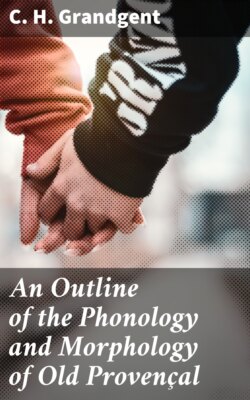An Outline of the Phonology and Morphology of Old Provençal

Реклама. ООО «ЛитРес», ИНН: 7719571260.
Оглавление
C. H. Grandgent. An Outline of the Phonology and Morphology of Old Provençal
An Outline of the Phonology and Morphology of Old Provençal
Table of Contents
PREFACE
ABBREVIATIONS AND TECHNICAL TERMS
SIGNS AND PHONETIC SYMBOLS
AN OUTLINE OF THE PHONOLOGY AND MORPHOLOGY OF OLD PROVENÇAL
I. INTRODUCTION
II. PHONOLOGY
1. ACCENT
2. VOWELS
QUANTITY
ACCENTED VOWELS
a
ẹ
ę
ị
ọ
ǫ
ụ
au
UNACCENTED VOWELS
Initial Syllable
Intertonic Syllable
Penult.[28]
Final Syllable
3. CONSONANTS
INITIAL CONSONANTS
Single Initial Consonants
Initial Groups
MEDIAL CONSONANTS
Single Medial Consonants
Medial Groups
1. Double Consonants
2. Groups Ending in L
3. Groups Ending in R
4. Groups Ending in W
5. Groups Ending in Y
6. Groups Beginning with L, M, N, R, or S
7. Miscellaneous Groups
FINAL CONSONANTS
Single Final Consonants
Final Groups
SPORADIC CHANGE
Insertion
Metathesis
Dissimilation
III. MORPHOLOGY
1. DECLENSION
NOUNS
First Declension
Second Declension
Third Declension
ADJECTIVES
Comparison
Numerals
PRONOUNS
Articles
Personal Pronouns.[95]
Conjunctive Forms
Disjunctive Forms
Possessives
Singular Possessive
Plural Possessor
Demonstratives
Interrogatives and Relatives
Indefinite Pronouns and Adjectives
2. CONJUGATION
THE FOUR CONJUGATIONS
FUNDAMENTAL CHANGES IN INFLECTION
PAST PARTICIPLE
FUTURE AND NEW CONDITIONAL
Future Endings
Conditional Endings
PRESENT
Double Stems
Peculiar Forms
Personal Endings[122]
IMPERFECT INDICATIVE
PRETERIT, OLD CONDITIONAL, AND IMPERFECT SUBJUNCTIVE
Preterit
Weak Preterits
Strong Preterits
Old Conditional
Imperfect Subjunctive
Footnote
INDEX
Отрывок из книги
C. H. Grandgent
Published by Good Press, 2021
.....
(b) In many learned words Latin ĭ is represented by i in Provençal: albir, martire, edifici, iuzizi, servizi, vici, etc.; iusticia, leticia, tristicia, etc. Aurilha (also ẹ) < aurĭcula, cilh, (also cieilh, sobreselhs) < cĭlium, issilh < exĭlium, familha < famĭlia, maístre (also maẹstre maiẹstre) < magĭstrum, meravilha (also ẹ) < mirabĭlia, perilh < perĭculum, etc., are probably learned forms. Máistre and mestre are French.
(c) Ciri (cere) = cēreum, iure (cf. ebriac) = ēbrium (or ✱ĕbrium), marquis (ẹ), merci (ẹ), país (ẹ) = ✱pagēnsem, plazir (ẹ), pris (ẹ), etc., are French.[15] For a discussion of iure and a different explanation of ciri, see P. Savj-Lopez, Dell’ “Umlaut” provenzale, 1902, p. 4.
.....